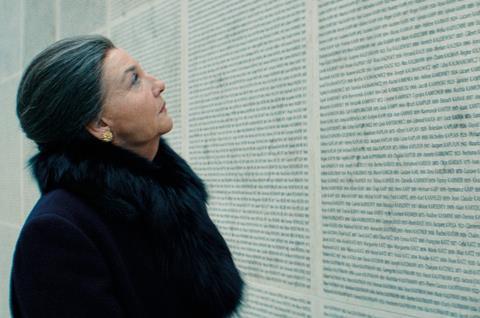Olivier Dahan follows ’La Vie En Rose’ and ’Grace Of Monaco’ with this portrait of inspirational French politician Simone Veil

Dir: Olivier Dahan. France. 2022. 140mins
Following global hit La Vie en Rose, in which Marion Cotillard excelled as Edith Piaf, and guilty pleasure Grace of Monaco, starring Nicole Kidman, French writer-director Olivier Dahan caps his trilogy devoted to noteworthy 20th century women with an ambitious, frequently didactic but unquestionably educational look at the truly remarkable French politician Simone Veil (1927-2017).
Weaves a sensory narrative based less on chronology than on lasting emotional echoes
Having surpassed 1.5 million admissions in France, where it is still going strong after releasing on October 12 through Warner Bros, Simone, A Woman of the Century (Simone - le voyage du siècle) covers Veil’s life from her happy childhood in a loving and well-off secular Jewish family through her arrest and deportation to Auschwitz the day after her high school graduation (her mother perished there and Veil never saw her father and brother again), through her post-war accomplishments. These included being the only woman at arguably France’s most elite university, her successful campaign to legalize abortion in France and her role as the first president of the European Parliament. She was also a wife and mother.
Having experienced obscene attacks on human dignity at the hands of the Nazis, Veil grew up to be a crusader. She was a trail-blazer in demanding such things as: basic amenities and healthcare for prisoners – “Madame, are you suggesting that we set up libraries for prisoners?!” asks an incredulous boss; compassion for AIDS sufferers; support centres for long-term drug addicts; and, of course, led a brave campaign for legal abortion, which left her open to insult and abuse. (The filmmakers use transcripts from the debates on the floor of French Parliament but, while Veil didn’t like being insulted, she found unpleasant obstacles in post-war society paled in comparison to the camps.)
Despite such opposition, what is known as The Veil Law passed in the small hours of the morning on 17 January 1975, securing access to the safe, legal and publicly funded procedure known in French as ‘voluntary interruption of a pregnancy.’ One can speculate that had Veil perished in Auschwitz, that crucial advance in health care might have been delayed for decades.
Veil’s relationship with her husband Antoine (played by Mathieu Spinosi as a young man, and Olivier Gourmet in later years) took an interesting turn when, to further his career, the young couple agreed to a political posting in Germany, the last place most survivors of the Nazi regime would willingly venture so soon after the war. And Veil resented her home country’s informal policy of sweeping its policy of collaboration with Nazi Germany, and the mechanics of deportation, under the rug. It was years before she could be instrumental in confronting that legacy. At a ceremony to lay the first bricks for a new school, an official complimented Simone on how she handled a trowel and cement. “It was my job in the camps,” she replied. Working as a mason had saved her life. Wrenching interviews for French television followed.
Veil is splendidly portrayed as a young woman by Rebecca Marder, with Elsa Zylberstein — in heavy prosthetic make-up — playing her from1968 on. The project was initiated by Zylberstein, who knew the real Simone Veil and worked hard to master her speech patterns – an accomplishment for which many French commentators have taken her to task, along with Zylberstein’s admittedly extensive make-up. Non-French viewers are unlikely to care about the discrepancies between Marder’s relatively natural performance and Zylberstein’s more mannered one. But Marder has the advantage of playing someone who was not yet famous.
The film’s style is similar to La Vie En Rose – an almost woozy but controlled camera drops in and out of episodes in Veil’s life weaving a sensory narrative based less on chronology than on lasting emotional echoes. Foremost being that she remains — understandably —haunted by having witnessed evil up close and very personal. One aspect of what we now call post-traumatic stress was her longtime inability to sleep in a comfortable bed, preferring the hard floor.
While not as stark as, say, Son of Saul, the concentration camp imagery is respectfully harsh, and more extensive than one might expect. The death march at the war’s end as the Soviet Army approached is captured with horrifying grandeur in one extras-laden shot. Dahan (who writes, directs and co-edits) has explained the importance of showing the camps, because today’s teenagers have not seen Claude Lanzmann’s irrefutable doc Shoah, or Spielberg’s fact-based Schindler’s List or Polanski’s fact-based The Pianist. He has a point. For great swathes of contemporary audiences, Wakanda probably seems more real than the horrors of WWII. Super-hero movies are swell but a well-crafted film devoted to a real-life hero — one to whom even the most virulent European anti-Semites owe a great deal — is a fine use of the medium.
Production companies: Marvelous Productions, France 2 Cinéma, France 3 Cinéma, Scope Pictures
International sales: Other Angle Pictures contact@otheranglepictures.com
Producers: Vivien Aslanian, Romain Le Grand, Marco Pacchioni
Cinematography: Manuel Dacosse
Production design: Christian Marti
Editing: Olivier Dahan, Richard Marizy
Music: Olvan Jacob
Main cast: Elsa Zylberstein, Rebecca Marder, Elodie Bouchez, Judith Chemla, Olivier Gourmet, Mathieu Spinosi, Sylvie Testud, Philippe Torreton























